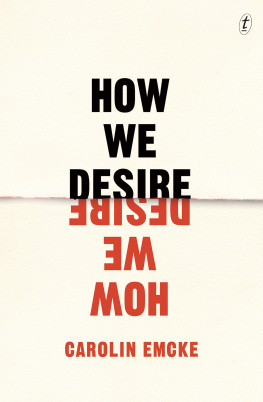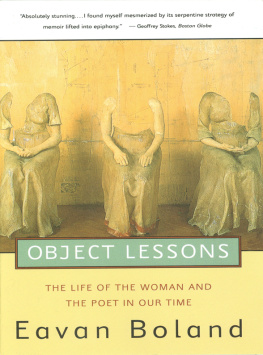ALSO BY KIM CHERNIN
The Obsession
The Hunger Song (poems)
In My Mothers House
The Hungry Self
The Flame Bearers: A Novel
Reinventing Eve
Sex and Other Sacred Games
Crossing the Border
A Different Kind of Listening: My Psychoanalysis and Its Shadow
In My Fathers Garden: A Daughters Search for a Spiritual Life
Cecilia Bartoli: The Passion of Song
My Life as a Boy
A Womans Story
KIM CHERNIN
ALGONQUIN BOOKS OF CHAPEL HILL 1997
Published by
ALGONQUIN BOOKS OF CHAPEL HILL
Post Office Box 2225
Chapel Hill, North Carolina 27515-2225
a division of
WORKMAN PUBLISHING
225 Varick Street
New York, New York 10014
1997 by Kim Chernin. All rights reserved.
Library of Congress Cataloging-in-Publication data is available for a previous edition of this work.
For Renate
Part 1
1
No one who knew me back then thought I would turn into a boy. I looked the way many women do in their thirties, ample and proud of it. In our family pictures there is Max with his long hair, our small daughter Larissa in tie-dyed shirts and jeans. I am usually wearing low-cut long dresses. We seem to be on our way to a costume party, but thats the way a lot of people looked, especially in Berkeley, during the seventies: the men with beards, the women in fringed shawls and ethnic blouses. No, I never expected to turn into a boy. But that is a dangerous time in the life of a woman, when she is still in her thirties and her only daughter is off to college.
Yes, a dangerous time. It involves a break with the past, the anticipation of a sudden freedom, no kids in the house, a new beginning for the mother, as if she too and not only the daughter were taking off into her own life. Anything possible. Future unknown. Time for the unlived life to rise up and stake its claim. Everything you might have been but didnt become; anything you might have wished to be but put aside. Nows your chance.
Some people wont let anything happen to them until they can explain how it could happen; therefore nothing much happens and they spend their time fending off the unlikely. I didnt want that to happen to me. I didnt want to stay as I was, hidden away in my own private world, in my second marriage, because there was no reason, none that anyone else would find convincing, to leave.
If a woman in her thirties turns into a boy, that may mean shes having trouble getting out of the place shes in. She requires the instinctive, wholly natural ruthlessness of a boy. He will leave home; everyone expects it of him. He wont move in next door to his mother or around the block and raise children, not likely. He wont give it a second thought: hes off into the world, hes a boy, hes going.
Ive watched boys take off. Ive seen them on bikes, skateboards, motor scooters, sliding on a piece of waxed cardboard. They fly down the middle of the street, cars going fast uphill, downhill, do they care? The direction of a boy is straight out the door, down the hill, out of the neighborhood, into the world. No second thought at leaving people behind, leaving them to fend for themselves as he takes off, hellbent for his own future without them.
Ive seen girls on skateboards and girls on waxed cardboard, but I never saw a girl who did not look back and wonder. Not ever. Because there is always someone standing at the door, someone waiting for you to come home, someone who will be happier when they hear your key in the lock. Girls are always aware of this and boys are not.
Women, especially mothers, know in every moment who is waiting for them to get back home, to call in, to fetch them; this knowledge is what it means to be a woman. Therefore the fate of a girl, the future shes definitely growing into, holds the certainty of restriction. But for a boy, as I have often observed, there is little danger of becoming a woman. He can be as reckless, as ruthless as he pleases, as carefree, devil-may-care as he likes, breaking his mothers heart, casting off the girl whos waiting for him in the garden. This guy has got to go to sea, and so hes off.
If ever the boy stops being a boy (and this is not inevitable), the man he becomes will have no more impulse, in being a man, to fret over the people hes left behind. This ease is never possible for the girl. Even if she went from girl to woman in her fathers house, shed be thinking about the people downstairs, for whom she is not baking while she is writing poetry. A real artist, they say, goes on perpetrating whatever creative act hes involved in, even if the children are crying; he doesnt stop, he doesnt look up, he doesnt even bat an eyelash. According to this, no woman is ever an artist.
Of course, these days girls are almost everything boys are. But if you are a woman at that dangerous time in your life, when you have just lost a reason for going on being the way youve been, if your kids have gone from home, or someone ill or aging youve been caring for has just died, it wont do you much good to turn into a girl, not even a tough girl who can kick a ball, who knows how to fight when a good fight is needed, can curse, will race her brothers and sometimes beat them. It wont do much good because this tough girl must not cry. If she ever wants to get away from home, to leave, to have a future of her own, she has to sacrifice the soft and sensitive romantic yearnings the boy can keep for a time, can even use, to get him out into the world.
There he is, standing in the rain outside his girls window. Tomorrow he will spot a woman on the bus and take off, passionately, desperately, into the world to follow her. The tough girl cannot allow herself so much need for another person. The boy weeps when his girl lets him down, walks through the park all night in his bare feet, renews his love by plunging himself into an ice-cold baptismal woodland pool. He is young but he will love her forever. The tough girl has got to prove that she needs no one.
The tough girl, under this pressure, may come to have more in common with a hard man than she has with a boy. In the girl and in the man, something infinitely tender has had to be crushed to achieve a semblance of autonomy. The boy has not yet had to make this sacrifice. For a brief, endangered season of grace, he remains a creature of accomplished paradox, holding simultaneously the capacity for profound attachment and the ability to break it off, when he must, to follow his own course.
2
When Max and I bought our house in the early seventies, there were no windows opening out onto the vast inland sea first discovered in 1769 by Sergeant Ortega, of the Portola exploring party. He and his men, hunting for deer, climbed the eastern grassy slopes of the East Bay and beheld a view similar to the one still visible today when the fog is up.
Still visible today? Well, thats what I used to say, standing on the deck, when we first bought the house. My mother and my husband didnt know whether to take me seriously, but my daughter knew that I was serious. Of course, taking an idea seriously is not quite the same as taking it literally, a distinction my mother could never make.
In those days, whenever my mother visited, we used to walk down to the Euclid Avenue Rose Garden. My mother cherished it, not primarily for its fifty varieties of roses, but even more because it was one of the WPA projects that, at the instigation of the radical movement, had put unemployed men back to work during the thirties.
The past I cherished was more remote. I claimed to behold the long-forgotten sloughs and channels, the dark marshes, the oak savannas, the streams winding through cottonwoods to fall hard down into the plains, which had been the Berkeley landscape before European settlers arrived to change it all. I told my mother that I could, in the haze of an early dawn, make out the smoke rising from the Huchiun villages along the shore of the San Francisco Bay, where the freeway runs now.
Next page









